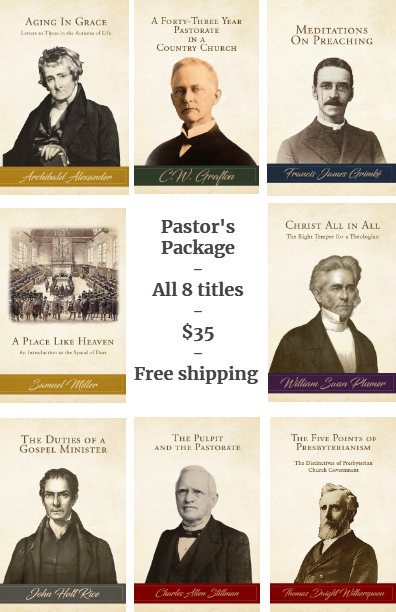Receive our blog posts in your email by filling out the form at the bottom of this page.
It was on November 13, 1888 — after 47 years of marriage to the Rev. Benjamin Morgan Palmer — Mrs. Mary Augusta Palmer entered into her eternal glory. The grief that her husband endured was tremendous. Among the many who wrote letters of condolence to him was the Rev. Theodore Ledyard Cuyler of Brooklyn, New York.
In his autobiography, Recollections of a Long Life, pp. 221-221 — which, while writing, he received news of the death of Rev. Palmer — he had this to say:
As my readers may all know, Dr. Palmer, through the Civil War, was a most ardent Secessionist, and as honestly so as I was a Unionist….Soon after my visit to New Orleans, my old friend was sorely bereaved by the death of his wife. I wrote him a letter of condolence, and his reply was, for sweetness and sublimity, worthy of Samuel Rutherford or Richard Baxter. As both husband and wife are now reunited I venture to publish a portion of this wonderful letter — both as a message of consolation to others under a similar bereavement and a s tribute to the great loving heart of Benjamin M. Palmer.
First, we turn to Rev. Cuyler’s letter, which can be read in Thomas C. Johnson, The Life and Letters of Benjamin Morgan Palmer, pp. 529-530:
176 South Oxford Street, Brooklyn, December 21, 1888
My Dear Dr. Palmer: I have just received, through the relatives of Mrs. Professor Rogers, the confirmation of the report that your beloved wife had been taken home to her rest and her reward. When I heard the report a fortnight ago I did not credit it — as I had seen no notice of it in the Presbyterian.To you — my beloved brother! who know so well where the ‘Eternal Refuge’ is, and how to find the ‘Everlasting Arms,’ I need send no fraternal counsels. But my own dear wife joins me in heart-felt sympathy and our sincerest condolence.
I have known what it was to give up beautiful and beloved children — but the trial of all trials has been spared me; and to you the journey of your remaining days will be with these words on your lips.
‘Each moment is a swift degree
And every hour a step towards Thee.’May the richest and sweetest spiritual blessings fill your soul — ever ‘unto all the fullness of God!’ And your ministry be most abundant in the Lord!
Please present our kind regards to your children and believe
Ever yours in Christ Jesus,
Theo. L. Cuyler
For Rev. Palmer’s letter in reply, we may turn to Rev. Cuyler’s autobiography again, pp. 222-223, or Johnson’s biography, pp. 526-527:
Truly my sorrow is a sorrow wholly by itself. What is to be done with a love which belongs only to one, when that one is gone and cannot take it up? It cannot perish, for it has become a part of my own being. What shall we do with a lost love which wanders like a ghost through all the chambers of the soul only to feel how empty they are? I have about me, blessed be God! a dear daughter and grand-children; but I cannot divide this love among them, for it is incapable of distribution. What remains but to send it upward until it finds her to whom it belongs by right of concentration through more than forty years?
I will not speak, my brother, of my pain — let that be; it is the discipline of love, having its fruit in what is to be. But I will tell you how a gracious Father fills this cloud with Himself — and covering me in it, takes me into His pavilion. It is not what I would have chosen; but in this dark cloud I know better what it is to be alone with Him; and how it is best sometimes to put out the earthly lights, that even the sweetest earthly love may not come between Him and me. It is the old experience of love breaking through the darkness as it did long ago through the terrors of Sinai and the more appalling gloom of Calvary. I have this to thank Him for, the greatest of all His mercies, and then for this that He gave her to me so long. The memories of almost half a century encircle me as a rainbow. I can feed upon them through the remainder of a short, sad life, and after that can carry them up to heaven with me and pour them into song forever. If the strings of the harp are being stretched into a greater tension, it is that the praise may hereafter rise to higher and sweeter notes before His throne — as we bow together there.
How poignant these words are, by he who was encircled by a rainbow, and what a tribute not only to the devotion of a husband, but also to the love of two precious saints. As Rev. Cuyler intended — who himself wrote God’s Light on Dark Clouds, after the loss of two infant children and a 22 year-old daughter, and many other words of comfort — may these words of wisdom and solace be an encouragement to others who have known grief and loss.



